Houston Can't Be Defended — But Can It Be Beaten?
Houston Can't Be Defended — But Can It Be Beaten?
By virtually every metric, the Houston Rockets — not the Golden State Warriors — are the "best" team in the NBA. But are they really?
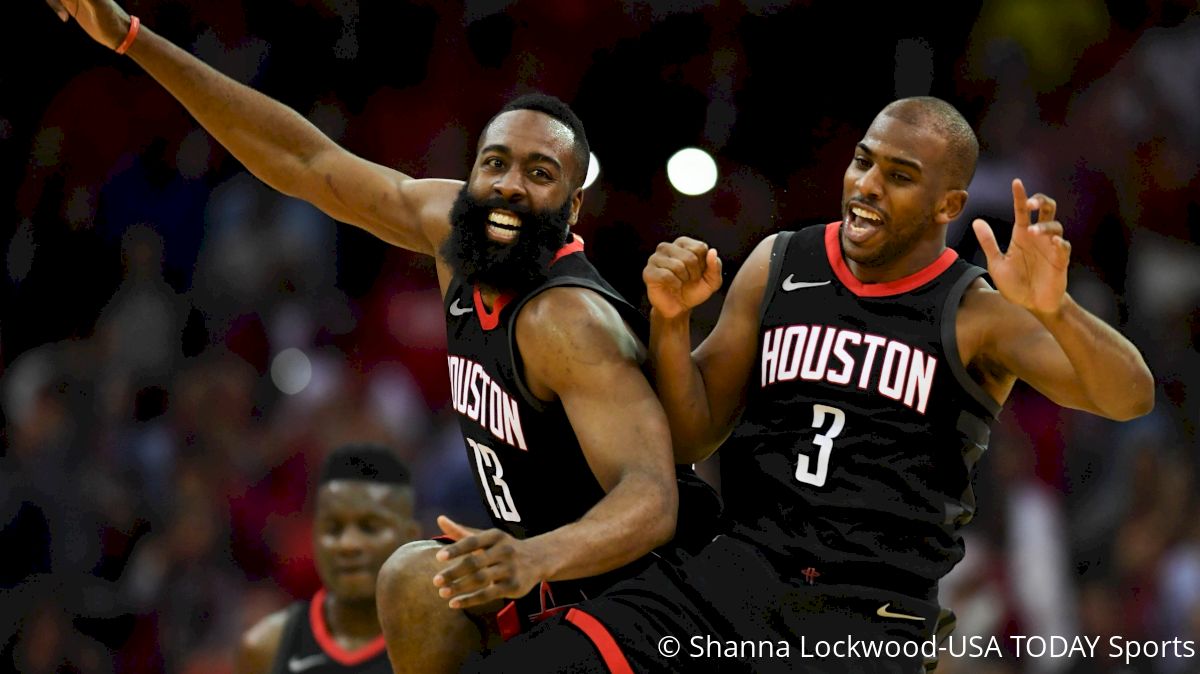
Unlock this article, live events, and more with a subscription!
Already a subscriber? Log In
Who’s the best team in the NBA?
The Golden State Warriors you say? They are the defending champions with four all-stars in their starting lineup. But by any metric we like to use to evaluate a team, it’s the Houston Rockets who lead the pack. Best record in the league? Rockets. Best road record in basketball? Yes. Best point differential in the NBA? That, too. They have the league’s best overall player, to date, as well, in James Harden, the leading contender for MVP down the stretch.
They set the “space and pace” bar with record-setting 3-point attempts and makes last year, and after adding Chris Paul this offseason, experts wondered if their sizzle would slacken some since Paul likes to control the ball more than most guards do. This year’s version of Mike D’Antoni’s system is shockingly slow and, perhaps, that’s why they are so good. The Rockets are not “seven seconds or less” but, rather, a throwback to the iso-based teams of the past.
And they can’t be guarded.
There is no getting around that fact. This Houston team put the brakes, literally, on what used to be one of the few fastest teams in the NBA. The Rockets were the third fastest last season and the seventh fastest two seasons ago, with most of the teams above them actually being in tank mode (one surefire way to lose more is to play faster with less talent).
This year, they stand at 11th in pace and are sinking fast. In February, Houston was dead last in pace, a trend that began a few months ago. You are reading that right, the Rockets have been more car and less spaceship as the season has evolved. A slow car at that.
What is happening? Besides winning, that is, because Houston is 22-4 in 2018, getting the "W" in all 12 February games (again, playing the league’s slowest pace) while on a 21-2 overall streak since January 8.
It’s fair to have guessed that the arrival of Paul and his ball-dominant style would be the reason why the team plays slower. But it isn’t really accurate. Harden has become the most iso-based player in the game and probably the best at it, so his coach has let his team slow down to better take advantage of the superstar’s gifts. Harden leads the NBA in usage rate, points per shot attempt, and in assist percentage (the percent of a team's assisted field goal makes) while being middle of the pack in overall turnover percentage. Houston has the second-best offense in the NBA precisely because Harden controls more than 40 percent of the action for his team, and he is the most productive and efficient primary ball handler in the game today.
Though the Rockets live so much off of Harden isos, it isn’t their only “brew” of choice. Their wings, like Trevor Ariza, will still look to zoom down the court for easy dunks after a missed shot by an opponent. Paul and Harden have excellent hit-ahead passing skills, and defenders tend to lose men at the rim when focusing too much on either ball handler.
When Harden pushes the pace, he is doing so knowing his team is nothing but shooters or rim-runners, and he is brilliant at driving gaps and getting layups or fouls (Harden leads the league again in free throws made again by nearly 90). So if at any point the defense surrounds him inside and doesn’t foul him he has open targets typically on either side of the court. Other than LeBron James, no elite offensive scoring threat is better at remaining poised and delivering the right pass than Harden is today.
In the half court, Houston will run double ball screens, using Harden then Clint Capela as the screeners for Paul. It causes more problems than you would think because of the potential nightmare matchups with either guard versus the man defending Capela or Capela’s man on either guard. The combination of screens forces defenders to think faster than they otherwise would on just a single screen. This allows Houston’s big man a good number of straight-line runs to the rim for uncontested dunks. Defenders are just too often flummoxed with what they should be doing to slow down Harden or Paul, or to contest the deep shooters placed expertly out in space around the 3-point line, thus they end up freezing and giving up a dunk often.
There are more actions in Houston’s arsenal, to be sure: dribble hand-offs, standard ball screens from all over the court, combos which start with screens and end with a Harden iso, Paul post-ups, Harden pinch post entries, et al. This roster is deep with talented veterans who know how to cut, space, and shoot. Eric Gordon is a fortunate shooter to be paired up with two dynamic guards like Paul and Harden. They are equally fortunate to have him, and D’Antoni looks to run “special” actions to create great shots for his best player off the bench.
This team can run almost any set well, but, as it happens, there is one that stands out to me the most, for its simplicity and its sheer wrecking power. I call it the “dragon roll” — in reality, it’s the drag screen and roll Capela offers for Harden (mostly) in early offense.
On a ball push or just the semi-break, Capela arrives late to the screen as Harden “settle dribbles” to a perimeter spot, seemingly waiting for something to happen elsewhere on the court. Instead Capela screens, Harden uses it or refuses it, and then he attacks the soft middle of the paint while Capela races to the rim. From there Harden just reads the defense. Clog up Capela on the roll? He gets a layup or floater. Attend to Harden’s drive too eagerly with a big? Throw the lob to 13 feet where only a running Capela can get it. Send in extra defenders from the perimeter? Harden adeptly kicks to a shooter. There is a reason why Capela leads the league in field-goal percentage. Dunks are his thing and they are close to a sure thing.
There are some concerns Houston will have to face in the postseason. Can the Rockets' coach and two best players face down their past demons and put up numbers worthy of their legacy? Will Harden hit the same wall he hit last year near the end of the Spurs series? Can they make 20-plus 3s in at least two games, which become almost certain wins, then find ways to claw through for two more wins in the other five games?
We still have a long way until May, but Houston’s offense is clearly more than a one-trick mirage that will wilt in a slightly slower playoff pace. The slower the game the more potent the Rockets' attack is — and it's something the Warriors will be readily preparing for if they face each other to win the West.
Related Content
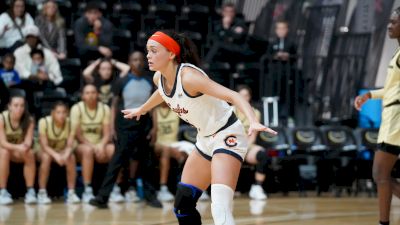 Makayla Alvey Is A Straight Baller For Carson-Newman Women's Basketball
Makayla Alvey Is A Straight Baller For Carson-Newman Women's BasketballApr 18, 2024
 WNBA Draft 2024 Recap: Caitlin Clark Goes No.1 To Indiana Fever
WNBA Draft 2024 Recap: Caitlin Clark Goes No.1 To Indiana FeverApr 16, 2024
 Indiana Fever Roster With No.1 Pick Caitlin Clark Following WNBA Draft
Indiana Fever Roster With No.1 Pick Caitlin Clark Following WNBA DraftApr 15, 2024
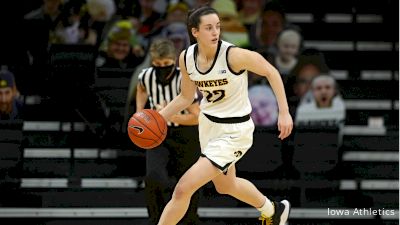 How To Watch The WNBA Draft 2024: Here's What To Know
How To Watch The WNBA Draft 2024: Here's What To KnowApr 11, 2024
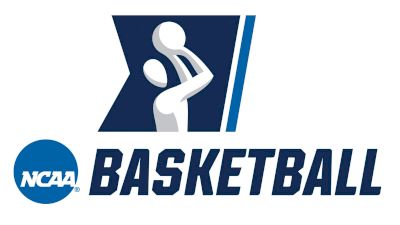 Women's NCAA Basketball Rankings: Way-Too-Early Top 25 for 2024-2025 Season
Women's NCAA Basketball Rankings: Way-Too-Early Top 25 for 2024-2025 SeasonApr 8, 2024
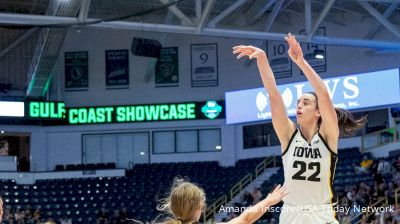 2024 WNBA Mock Draft Post Final Four: Who's After Caitlin Clark at No. 1?
2024 WNBA Mock Draft Post Final Four: Who's After Caitlin Clark at No. 1?Apr 7, 2024
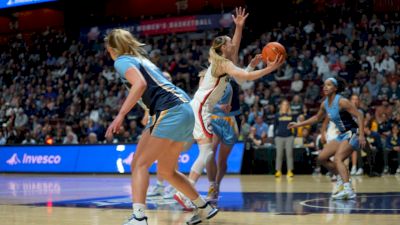 Paige Bueckers And The UConn Huskies Are Final Four Bound
Paige Bueckers And The UConn Huskies Are Final Four BoundApr 4, 2024
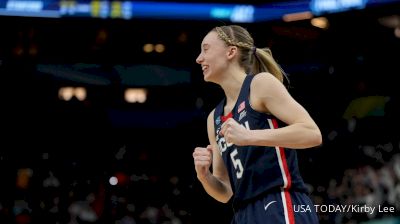 NCAA Final Four Preview: Caitlin Clark vs. Paige Bueckers By The Numbers
NCAA Final Four Preview: Caitlin Clark vs. Paige Bueckers By The NumbersApr 4, 2024
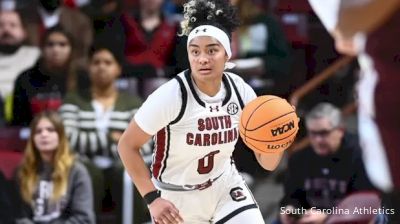 South Carolina vs. NC State In The NCAA Women's Final Four: What To Know
South Carolina vs. NC State In The NCAA Women's Final Four: What To KnowApr 4, 2024